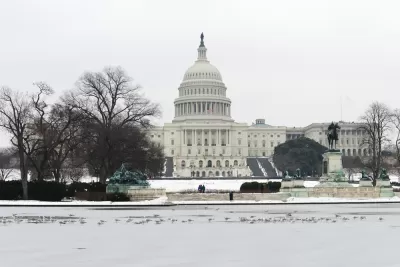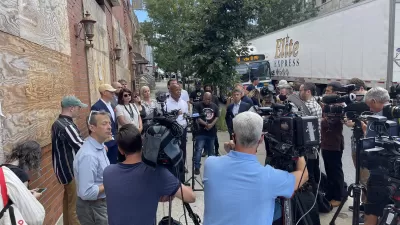2022 was full of historic legislative accomplishments on climate policy. 2023 is unlikely to achieve the same significance, though the changing climate demands more of the same.

An article by Maxine Joselow for the Washington Post previews the year to come in a critical moment for U.S. climate policy.
Before previewing the coming year, Joselow sets the stage with a recap of a momentous year in U.S. climate policy, which included a slew of unprecedented achievements, headlined by the adoption of the nation’s largest ever climate bill, the Inflation Reduction Act.
As for what to watch in 2023, Joselow predicts the following, with more detail included in the sources article below:
- Climate policy action will shift from the federal government to the states with Republicans in control of the House of Representatives and democrats with new trifectas in state governments. States that could potentially enact broad climate policies in 2023 include Maryland, Massachusetts, Michigan, and Minnesota, according to the article.
- Federal agencies will struggle to enact portions of the Inflation Reduction Act and the Infrastructure Investment and Jobs Act. Examples from the Treasury Department, the U.S. Environmental Protection Agency, and the Energy Department are cited. Unmentioned is a controversial decision by the Government Accountability Office to enforce a memo by the Federal Highway Administration as a rule.
- The U.S. Environmental Protection Agency will “race” to finalize critical climate rules, such as a “self-imposed March deadline for proposing new greenhouse gas rules for power plants.”
More detail on each of these three trends can be found in the source article below.
FULL STORY: 3 trends to watch in U.S. climate policy in 2023

Planetizen Federal Action Tracker
A weekly monitor of how Trump’s orders and actions are impacting planners and planning in America.

The Simple Legislative Tool Transforming Vacant Downtowns
In California, Michigan and Georgia, an easy win is bringing dollars — and delight — back to city centers.

San Francisco's School District Spent $105M To Build Affordable Housing for Teachers — And That's Just the Beginning
SFUSD joins a growing list of school districts using their land holdings to address housing affordability challenges faced by their own employees.

In More Metros Than You’d Think, Suburbs are Now More Expensive Than the City
If you're moving to the burbs to save on square footage, data shows you should think again.

The States Losing Rural Delivery Rooms at an Alarming Pace
In some states, as few as 9% of rural hospitals still deliver babies. As a result, rising pre-term births, no adequate pre-term care and "harrowing" close calls are a growing reality.

The Small South Asian Republic Going all in on EVs
Thanks to one simple policy change less than five years ago, 65% of new cars in this Himalayan country are now electric.
Urban Design for Planners 1: Software Tools
This six-course series explores essential urban design concepts using open source software and equips planners with the tools they need to participate fully in the urban design process.
Planning for Universal Design
Learn the tools for implementing Universal Design in planning regulations.
Smith Gee Studio
City of Charlotte
City of Camden Redevelopment Agency
City of Astoria
Transportation Research & Education Center (TREC) at Portland State University
US High Speed Rail Association
City of Camden Redevelopment Agency
Municipality of Princeton (NJ)





























